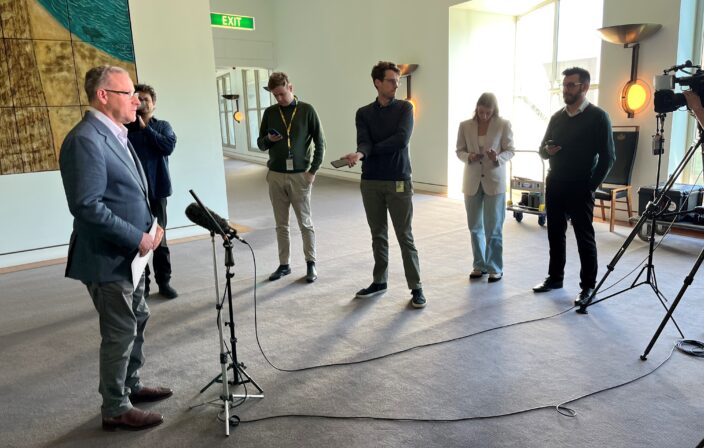Andrew McKellar interview with Greg Jennett, ABC News Afternoon Briefing
8 May 2023
|Transcripts
Event: Andrew McKellar interview with Greg Jennett, ABC News Afternoon Briefing.
Speakers: Andrew McKellar, chief executive Australian Chamber of Commerce and Industry; Greg Jennett, host ABC News Afternoon Briefing.
Date: 8 May 2023
Topics: Federal budget 2023-24; energy price relief; inflation; interest rates; petroleum resource rent tax; budget repair; passenger movement charge; labour and skills shortages; Migration Review.
E&OE
Greg Jennett, host ABC News Afternoon Briefing: Well, outside of energy bill relief, it’s not apparent that there’s any large scale handout in store directly for business. Nor have the main big business lobby groups actually been asking for much either – they’ve read the signals from the Reserve Bank on inflation. Andrew McKellar is chief executive of the Chamber of Commerce and Industry and he’s explained why they’ve chosen a more restrained approach this year. Andrew McKellar, it’s budget eve, so you are back with us once again. Welcome to Afternoon Briefing, as always. Energy price relief, we’re told will be a centrepiece of the budget for households and for business. Is it clear to you how all this money, it could be about $3 billion state and federal, can be delivered in a way that is not inflationary.
Andrew McKellar, chief executive Australian Chamber of Commerce and Industry: Hi, Greg. Great to be with you. Look, any form of relief on energy prices for households and for small businesses particularly, it’s going to be welcome, that’s the first thing. How it will be delivered, I think here, one of the important things is it needs to be delivered in a way which doesn’t cut against what the Reserve Bank is doing with interest rates. So, if it’s adding back into demand, if it’s holding demand up for longer, if it’s adding to those inflationary pressures, then the risk is that we have fiscal policy pushing in one direction and monetary policy going the other way. We don’t want to see an outcome where there’s likely to be a reaction from the Reserve Bank to push interest rates higher again. That would obviously be very counterproductive.
Greg: And there are live risks here out there, on the demand side, not only just in demand for power, I suppose, but there are also schemes that create deductions for small business to go and invest in new kit or to better insulate their buildings for instance. That is all generating demand, isn’t it?
Andrew: Well, those things are very important, and the reason for that is at the moment, one of the biggest constraints the economy is facing is really on the supply side. So, I think anything here which focuses on adding to that supply, undertaking more investment, encouraging business to be more efficient, adding to productivity, then I think that is going to be consistent with the objective of keeping inflationary pressures in the economy lower. So, I think those sorts of things are very positive and constructive, and we would support them.
Greg: More broadly, because the word surplus keeps coming up, it’s very much in our expectations for the current financial year. Do you think the temptation to spend some of that does in fact do what you said shouldn’t happen? That fiscal policy might be pulling against monetary policy by the Reserve Bank?
Andrew: Well, again, I think here the government is going to have to get the balance right. So, it’s a wonderful thing if we are to go into surplus, and a lot of that is driven by windfall revenues that have come about as a result of much higher commodity prices. That’s great. What we’ve got to ensure is that as much as possible of that extra windfall is turned back into paying down debt. The projection over the life of the forward estimates is over $100 billion worth of interest payments are there. It’s moving up from about $20 billion a year. That’s a huge cost to the expense of other programs. We’ve got to reduce that if possible.
Greg: And that will be a wafer thin surplus anyway by all accounts.
Andrew: Absolutely.
Greg: Business appears to, on what we know already, be spared any large nasties. In view of the fact that this is a Labor government, do you think that would be a relatively painless outcome for business if it’s not going to be hit with new taxes?
Andrew: In advocating in front of this budget, we, amongst other business groups, I think have been very careful. We’re not saying that we want particular special programs. Our emphasis has been on recognising that the government needs to get the budget back into order. It needs to undertake that process over the medium term of budget repair. We’re supportive of that process. We say there’s a lot they can do on the expenditure side to achieve that discipline. We certainly don’t want to see new taxes or significantly increased taxes coming in as part of that strategy. If they can achieve that balance, then business will be very positive, will be very supportive.
Greg: There might be some things at the margins though. For instance, in the tourism sector, I think everyone’s on high alert for an increase in the departure tax, so-called, or passenger movement charge is its technical name. Is that fair enough in view of the large number of overseas trips that Australians are now taking after the pandemic?
Andrew: We are cautious about that as well. I mean, if there’s one sector that’s been absolutely pummelled in the past several years through the pandemic and through other economic circumstances, it’s been the tourism and the hospitality industry. So, I think we would be very cautious about any increase in that charge. The other thing here is this is not a general revenue charge. Any increase in the revenue should be fed back into the purposes that it’s intended for. It really should be about supporting more effective borders, the movement of people across those borders, and in particular, the industries that are linked to that, the tourism and hospitality industries.
Greg: Well, it could actually become an incentive for people to holiday at home, domestically, couldn’t it?
Andrew: Look, I think at the margins, Australia obviously needs to remain competitive. There needs to be a clear justification between what that charge is for and where that money’s been spent. And I think at the end of the day, that’s the test.
Greg: All right. At the other end, really big business and big investments, the petroleum resource rent tax for offshore gas primarily is going up. I don’t think that really speaks to your membership necessarily, but do you welcome that?
Andrew: Look, we’re cautious about it. So here, there’s been some consultations with the industry, with the major gas producers. I think in the main, this represents a pull forward to some degree of the revenues that might have been further down the track. That said, it’s essential in this space that what we’ve got to be encouraging is exploration and production of gas in Australia. It’s very clear we have a critical situation with energy supply at the moment. Gas is an important part of the solution to that for the foreseeable future. We’ve got to maintain and attract those major investment projects to keep that part of the energy equation going. It’s vitally important to business.
Greg: And just finally, Andrew McKellar, population growth can’t continue at the rate that it’s been running at in recent years. Do you accept that? And what implications are there on the skills and labour side for that?
Andrew: Well, I think here we’ve just seen the government produce a major migration review. It was a very constructive review, and one of the most important things coming out of that we hope we will be that the temporary skilled migration intake will be better focused in the future. If that means that we can be more effective about attracting and retaining people to fill critical skill shortages, then that will be a better result. So, we’re encouraged by that, and I think businesses are looking forward to working with government to get those outcomes in place.
Greg: Plenty to look out for come tomorrow night. No doubt we’ll get a readout from you before too long. Andrew McKellar, thanks again for joining us.
Andrew: Perfect. Thank you.


